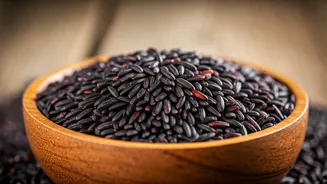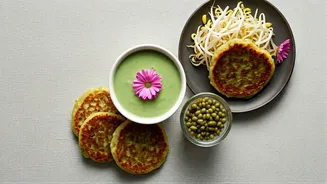Nutrient Powerhouse
Black rice stands out as a nutritional powerhouse, far surpassing many other rice varieties. Its dark color is a telltale sign of its high anthocyanin
content, a potent antioxidant also found in blueberries and other dark-colored fruits and vegetables. These antioxidants combat free radicals, protecting cells from damage and potentially reducing the risk of chronic diseases. In addition to antioxidants, black rice is a good source of fiber, essential for digestive health and maintaining stable blood sugar levels. It also provides essential minerals like iron, which is crucial for carrying oxygen in the blood, and magnesium, vital for various bodily functions including muscle and nerve function. The presence of these nutrients makes black rice a valuable addition to a balanced diet, offering a wide range of health benefits beyond just providing energy.
Antioxidant Benefits Abound
The remarkable antioxidant properties of black rice are a key reason to include it in your diet. Antioxidants are substances that neutralize harmful free radicals, which can contribute to aging and the development of diseases like heart disease and cancer. The anthocyanins in black rice are particularly effective antioxidants. Consuming foods rich in these compounds can help to protect your cells from damage, promote overall health, and potentially reduce the risk of certain chronic illnesses. Furthermore, the antioxidants in black rice contribute to its anti-inflammatory effects, which can benefit the body by reducing inflammation and supporting overall wellness. By incorporating black rice into your diet, you're investing in your long-term health and well-being.
Fiber for Digestion
Black rice is a valuable source of dietary fiber, crucial for maintaining a healthy digestive system. Fiber adds bulk to your diet, aiding in regular bowel movements and preventing constipation. This is particularly important because it promotes a healthy gut environment. Fiber also helps to slow down the absorption of sugar, which can help in managing blood sugar levels and preventing spikes after meals. This is beneficial for people with diabetes or those looking to improve their metabolic health. Furthermore, fiber can contribute to feelings of fullness, which can assist in weight management by helping you feel satisfied and reducing the likelihood of overeating. Incorporating black rice into your diet offers a delicious and effective way to support your digestive health and overall well-being.
Versatile Culinary Uses
Black rice's versatility in the kitchen makes it a welcome addition to any meal plan. It boasts a slightly nutty flavor and a chewy texture that complements a variety of dishes. Black rice can be used in numerous culinary applications, from simple side dishes to elaborate main courses. Cook it as a standalone side, combine it in salads for added nutrients and color, or use it as a base for delicious rice bowls. It also works well in stir-fries, adding a rich depth of flavor and texture. Black rice can also be used in some sweet applications; try it in puddings or as a base for breakfast porridges. With its adaptable nature, black rice can easily be integrated into many different cuisines and meal types, enhancing the overall dining experience.
Heart-Healthy Benefits
Consuming black rice can contribute to improved heart health. The antioxidants present in black rice help to reduce inflammation and protect blood vessels from damage, which are both crucial factors in preventing heart disease. Fiber, which is abundant in black rice, also plays a role in heart health by helping to lower cholesterol levels. Dietary fiber binds to cholesterol in the digestive system, preventing its absorption and promoting its excretion from the body. Studies suggest that a diet rich in whole grains, such as black rice, is linked to a lower risk of heart disease and stroke. Regularly including black rice in your meals can be a proactive step towards maintaining a healthy heart and overall cardiovascular well-being.














